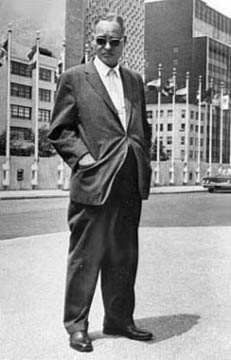|
| |
"Un-diplomatic" dining in the '50s"
“Even in Bunche's own life there were plenty of reminders, ranging from the ridiculous to the serious that the (race) struggle was by no means won. Typical…was his experience in a diner in 1950 which (Secretary-General Trygve) Lie gave in honor of Crown Princess Martha of Norway . Bunche was seated next to the wife of the head of Swedish-American Lines, a bibulous American-born Mrs. Lundbeck who, when Lie proposed a toast to U.S. President Truman, whispered to Bunche, “I hope he chokes.” “Who? Mr. Lie?” Bunche inquired. “No, the President,” she replied, and proceeded to denounce Truman's modest origins. When Bunche rebuked her, Mrs. Lundbeck said “You talk like one of those people who believe colored people ought to be equal.” A heated discussion of the alleged mental inferiority of blacks followed, after which Mrs. Lundbeck said, “Tell me, would you let your daughters marry colored men?” Bunche drew a deep breath and replied, “Why, my dear lady, I don't think I would object. My daughters…are necessarily colored because I am colored. In fact, I not only am colored, but am an American Negro.” Mrs. Lundbeck panicked, said Bunche was different, tried desperately to diffuse the situation and asked him if he had been to Norway . He said he was about to go. “What for?” she asked. “The Nobel Peace Prize,” he answered. “Who's getting it?” she asked. “Well, as a matter of fact, I am, Bunche replied. Mrs. Lundbeck later complained she had not been properly briefed.”
— Excerpt from the biography, "Ralph Bunche: An American Odyssey” by Brian Urquhart
|  |
|
Kenneth Clark on Bunche
R alph Bunche's influence on my social growth, insight, and incorrigible struggle for racial justice was both general and specific. An outstanding example of Bunche as a sensitive human being, who affected me personally and probably determined my destiny, was the fact that he, almost single handedly, saved me from being expelled or suspended from Howard University in my senior year. As editor of the student newspaper, I was one of the leaders of a group of students who picketed the restaurant in the Capitol building, which at that time (1935) did not served Negroes. As would be expected, we were arrested, and our confrontation with that racial injustice was well publicized. Mordecai Johnson, president of the university, believed that by our brash act we had jeopardized the congressional appropriation upon which the university depended. He demanded that we be brought before the faculty disciplinary committee. Bunche was a member of that committee, and he argued persuasively that we should be rewarded, instead of punished, for our act. He convinced the majority of the committee, and we were permitted to remain in school.
— Excerpt from Ralph Bunche, "The Human Being and the International Statesman in Ralph Bunche: The Man and his Times,” edited by Benjamin Rivlin
<Previous l Next>
|
|
|

